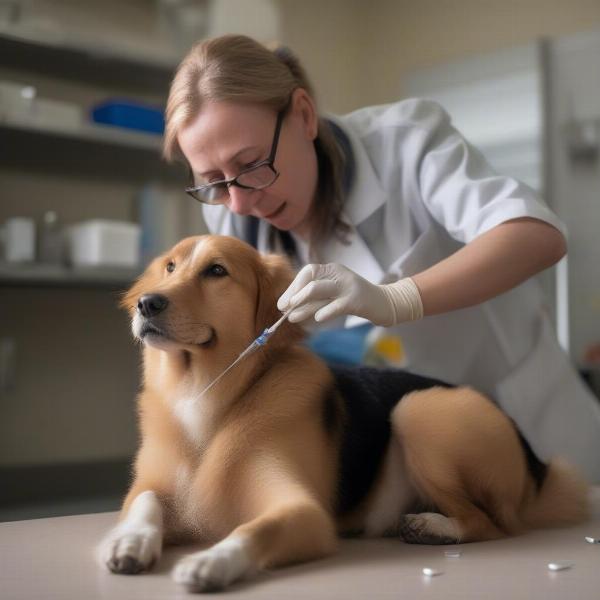Hookworms in dog feces are a serious concern for pet owners worldwide. These microscopic parasites can cause a range of health problems in dogs, from mild anemia to life-threatening conditions. Understanding how to identify, treat, and prevent hookworm infections is crucial for responsible dog ownership. This guide will equip you with the necessary knowledge to protect your canine companion from these harmful parasites.
Identifying Hookworms in Dog Feces
Recognizing hookworms in your dog’s stool can be challenging due to their tiny size. However, there are a few telltale signs to look out for. The most common indicator is the presence of dark, tarry stools, which indicates blood in the digestive tract. You might also notice your dog experiencing diarrhea, vomiting, or weight loss. A definitive diagnosis requires a fecal examination by a veterinarian, who will analyze a stool sample under a microscope to identify hookworm eggs.
The Dangers of Hookworms in Dogs
Hookworms attach themselves to the lining of a dog’s small intestine and feed on their blood, leading to anemia. In puppies and young dogs, severe hookworm infestations can be fatal. Adult dogs with compromised immune systems are also at higher risk of developing serious complications. Symptoms of hookworm infection can range from mild to severe and include lethargy, pale gums, poor coat condition, and breathing difficulties.
Treating Hookworms in Dogs
If your veterinarian diagnoses your dog with hookworms, they will likely prescribe a deworming medication. Several effective worm medicine for dogs are available, and your vet will choose the most appropriate one based on your dog’s age, weight, and overall health. It’s crucial to follow your veterinarian’s instructions carefully and complete the full course of treatment to ensure all the hookworms are eliminated. A follow-up fecal exam may be necessary to confirm the effectiveness of the treatment.
 Veterinarian administering deworming medication to a dog
Veterinarian administering deworming medication to a dog
Preventing Hookworm Infections in Dogs
Preventing hookworm infections is far easier than treating them. Regular deworming is essential, especially for puppies and dogs living in areas with high hookworm prevalence. Maintaining good hygiene in your dog’s environment is also crucial. Regularly dog poop pick up in your yard and dispose of it properly to prevent the spread of hookworm larvae. Avoid taking your dog to areas known to be contaminated with dog feces. If you live in Canada, consult with your vet about the best dog dewormer canada options.
What are the common signs of hookworms in dogs?
Common signs include dark, tarry stools, diarrhea, vomiting, weight loss, lethargy, pale gums, and poor coat condition.
How are hookworms diagnosed in dogs?
Hookworms are diagnosed through a fecal examination by a veterinarian, who will look for hookworm eggs in a stool sample.
Can hookworms be transmitted to humans?
Yes, hookworm larvae can penetrate human skin, causing a condition called cutaneous larva migrans.
How often should I deworm my dog?
The frequency of deworming depends on your dog’s age, lifestyle, and risk factors. Consult your veterinarian for personalized recommendations.
Conclusion
Hookworms in dog feces pose a significant threat to canine health. By understanding the signs, risks, and preventative measures, you can effectively protect your furry friend from these harmful parasites. Regular veterinary check-ups, proper hygiene, and diligent deworming are essential for keeping your dog happy and healthy. Remember, early detection and treatment are key to preventing serious complications associated with hookworm infections.
ILM Dog is a leading international pet website dedicated to providing expert advice on dog care and wellbeing. From breed selection to health and training, we offer a wealth of resources to help you navigate every aspect of dog ownership. Whether you’re a seasoned dog owner or a first-time puppy parent, ILM Dog has the information you need to provide your furry friend with the best possible care. For further assistance, please contact us via email at [email protected] or phone at +44 20-3965-8624. Visit ILM Dog for more expert tips and advice on dog care.